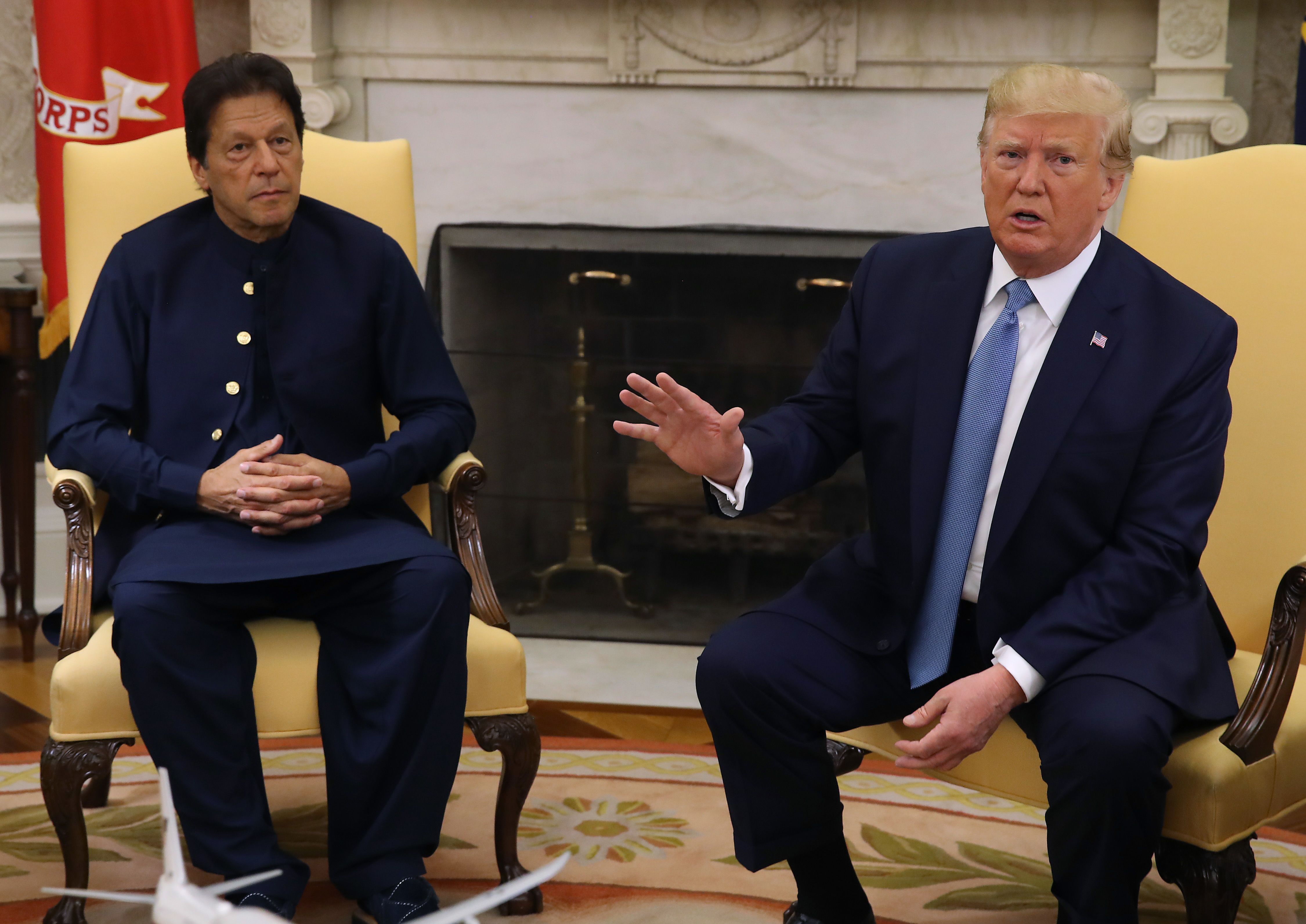
President Donald Trump and the Prime Minister of the Islamic Republic of Pakistan, Imran Khan, speak to the media in the Oval Office at the White House on July 22, 2019 in Washington, DC.
Mark Wilson | Getty Images
Pakistani Prime Minister Imran Khan’s three-day visit to the U.S. is not likely going to do much for his country’s struggling economy, a political analyst said Tuesday.
Structural problems have hamstrung growth, and Pakistan is awash in external debt, having taken on billions of dollars in loans from countries such as China and Saudi Arabia to ease pressures on its current account.
The International Monetary Fund recently approved a $6 billion loan package to shore up Pakistan’s economy. But growth is set to slow to 2.4% in the current fiscal year — from 5.5% in the year that ended June 2018, IMF predicted.
“I imagine that one of the requests that Imran Khan and other senior officials traveling with them in Washington have asked for is some type of stepped-up U.S. support for Pakistan’s economy,” Michael Kugelman, deputy director and senior associate for South Asia at the U.S.-based Wilson Center, told CNBC’s “Street Signs. “
He said it’s not likely that Washington will extend economic help to Pakistan yet, as there are other issues that take precedence in their bilateral dialogue — namely, Afghanistan and counter-terrorism. Instead, the U.S. is dangling the possibility of stronger trade and economic cooperation with Pakistan, if the latter were to help with the peace talks in Afghanistan and do more to crack down on terrorism within its borders, Kugelman said.
“If you look at the statement that the White House released soon before Prime Minister Khan had his meeting with Trump, there was a series of lines in the statement about how U.S. and Pakistan trade cooperation has increased in recent years, sort of like highlighting the fact that you do have this cooperation,” he said.
Kugelman added that Khan could potentially also look to the U.S. private sector to try and bring in some support to the Pakistani economy through new investments.
Afghanistan
The relationship between the U.S. and Pakistan has been strained.
Khan met with President Donald Trump on Monday in a push to mend ties between Islamabad and Washington over the protracted conflict in Afghanistan.
Last year, Trump accused Pakistan of providing “safe haven to terrorists” and complained on Twitter that the country gave the U.S. “nothing but lies & deceit” despite receiving billions of dollars in aid for more than a decade. He then suspended aid to the country. Pakistan denied those charges.
On Monday, the two leaders met at the White House where Trump sounded optimistic that Khan could help the U.S. broker a settlement to end the conflict in Afghanistan.
“I think Pakistan is going to help us out to extricate ourselves. We’re like policemen. We’re not fighting the war,” he told reporters, before adding that if he wanted to, he could win that war in a week. He did not elaborate. “I just don’t want to kill 10 million people,” he added.
Washington wants more cooperation from Pakistan in the Afghanistan peace process. According to Reuters, that includes a sustained crackdown on militants and terrorists within its borders, as well as help to “pressure the Taliban into a permanent ceasefire and participation in inter-Afghan negotiations that would include the Afghan government.”
Trump on Monday also hinted at the possibility of restoring about $1.3 billion in aid to Pakistan that was suspended last year.
At a media briefing in the Oval Office before their meeting, Khan said Pakistan needs peace and stability.
“We have had 15 years of fighting this war on terror. Over 70,000 Pakistani casualties. Over $150 billion lost to the economy. So, we desperately want peace,” he said.
Kashmir
The U.S. president also weighed in on Kashmir — a sensitive topic for both Pakistan and its neighboring rival, India. The disputed territory has been at the center of decades of conflict and multiple wars.
Earlier this year, Islamabad and New Delhi conducted retaliatory air strikes on each other following a terror attack in India-controlled Kashmir. That episode fueled concerns about stability in the region at that time.
Khan said that Islamabad had tried its best to resolve the dispute with New Delhi.
“We’ve made all overtures to India to start dialogue, resolve our differences through dialogue. But, unfortunately, we haven’t made headways as yet. But I’m hoping that President Trump would push this process,” Khan said.
Trump claimed during Monday’s media briefing that Indian Prime Minister Narendra Modi had asked him if he would be willing to mediate in the Kashmir dispute between the two nuclear rivals “because this has been going on for many, many years.”
India promptly denied Trump’s claim. A spokesperson for India’s external affairs ministry, Raveesh Kumar, said on Twitter that Modi had made “no such request” to Trump.
“It has been India’s consistent position that all outstanding issues with Pakistan are discussed only bilaterally,” Kumar said, adding, “Any engagement with Pakistan would require an end to cross border terrorism.”
— Reuters contributed to this report.

